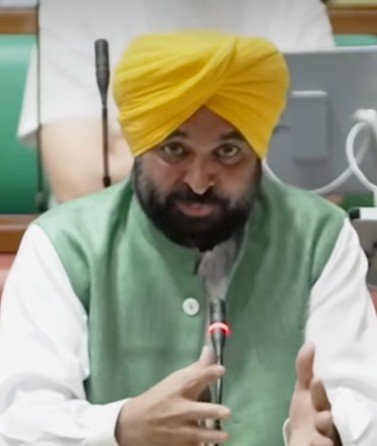In a moment of piercing urgency, Punjab Chief Minister Bhagwant Singh Mann stood before the state Assembly and described the state’s drug menace not as a social evil, but as a genocide — one that continues to silently wipe out the spirit of Punjab’s youth. Declaring that there would be no leniency for drug traffickers or their protectors, Mann launched a scathing critique of previous regimes and promised unrelenting action to dismantle the networks responsible for this humanitarian catastrophe.
The Chief Minister’s choice of words — “genocide of youth” — stunned the House and immediately resonated beyond the Assembly walls. His warning wasn’t just rhetorical flair. It was backed by a detailed account of arrests, raids, and narcotics seizures made under his administration, along with the open assertion that some political leaders have long protected the very cartels now under investigation. In an emotionally charged moment, Mann directly referenced the arrest of former minister Bikram Singh Majithia, accusing past governments of turning a blind eye while the state’s villages were being hollowed out by addiction.
Mann’s remarks come amid a renewed phase of Punjab’s “Yudh Nasheyan Virudh” (War Against Drugs) campaign. Over the past year, law enforcement agencies have carried out extensive anti-narcotics operations in border towns and rural districts where synthetic drugs, heroin, and pharma-based abuse substances have taken hold. Police reports suggest that over 12,000 FIRs related to narcotics have been filed since the beginning of 2024 alone, with a sharp increase in cross-border trafficking cases and seizures of high-purity heroin.
In his speech, Mann emphasized that “big fish” were no longer being shielded. “Those who once thought themselves above the law are now facing it,” he said, adding that multiple former political insiders are under the scanner. Without naming names beyond Majithia, the Chief Minister made it clear that political influence would not deter ongoing probes. “This government owes its allegiance to the youth of Punjab, not to the corrupt alliances of yesteryears,” he stated.
The political tone of Mann’s speech signaled a larger war being fought — one not only against drugs but also against entrenched power networks. Opposition leaders responded by demanding detailed records of prosecutions and convictions to measure the real impact of the government’s push. However, Mann remained firm that the public support for his government’s zero-tolerance approach justified its continuation.
Drug abuse in Punjab is not a new crisis. The state has for years grappled with staggering addiction rates, particularly among men aged 18 to 35. Multiple studies have reported high unemployment correlating with drug dependency, leading to devastating health outcomes and an erosion of family structures. With opioids and synthetic drugs infiltrating the rural heartland, entire villages have suffered generational damage. It is against this backdrop that Mann’s characterization of the crisis as a “genocide” takes on chilling accuracy — not through bullets, but by needles and powder.
But beyond language, the Mann government is attempting structural shifts. The state has increased funding for de-addiction centres, digital surveillance of pharmacies, and cross-border intelligence sharing with agencies in Rajasthan, Himachal Pradesh, and the BSF. The establishment of Fast Track Courts to expedite drug-related trials is also underway, aimed at ensuring that high-profile offenders are prosecuted swiftly.
Public opinion is now increasingly split between cautious optimism and lingering skepticism. While Mann’s directness is winning applause among youth organizations and victim families, civil society groups caution that real reform requires more than arrests. They point to the lack of consistent rehabilitation infrastructure, insufficient mental health support, and the need for community-led de-stigmatization of recovering addicts.
International observers have also begun to take note. Punjab’s drug crisis has periodically drawn attention from human rights organizations and global media, especially due to its spillover effects across the Indian diaspora. Mann’s declaration in the Assembly may now act as a catalyst for broader national and international conversations about addiction, enforcement, and accountability.
For now, CM Bhagwant Mann has drawn a moral line in the sand — a line that places the protection of Punjab’s youth above political correctness or bureaucratic restraint. Whether his words translate into long-term systemic change remains to be seen, but on July 15, he made one thing unmistakably clear: there will be no compromise, no delay, and no looking away.
#PunjabDrugCrisis #BhagwantMann #YudhNasheyanVirudh #AntiDrugCampaign #PunjabAssembly #YouthCrisis #DrugFreePunjab #IndiaNews #PoliticalAccountability #WarOnDrugs
This is a web generated news report.




